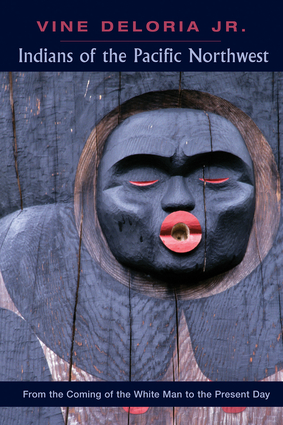

Indians of the Pacific Northwest
From the Coming of the White Man to the Present Day
HISTORY
176 Pages, 6 x 9
Formats: Paperback, Mobipocket, ebook: EPUB, ebook: PDF
Paperback, $21.95 (CA $25.95) (US $21.95)
Publication Date: September 2012
ISBN 9781555916886
Overview
Prior to the onslaught of the Europeans, the Puget Sound area was one of the most heavily populated regions north of Mexico City. The Native Americans who lived there enjoyed a bounty of seafood, waterfowl, and berries, which they expertly collected and preserved. Detailing the associated culture, technologies, and techniques, Vine Deloria Jr. explains in depth this veritable paradise and its ultimate demise.
Raising the possibility that the utopian lifestyle enjoyed by the Indians of the Pacific Northwest might have continued in perpetuity had Europeans not sought a Northwest Passage. Deloria describes in devastating detail the ramifications of the Europeans' migration into the territory. With more than two thousand American settlers in the Pacific Northwest by 1852, and with many more to come, the outbreak of disease and the encroachment of land speculators, railroad capitalists, and logging and mining interests forced the Native Americans to give up their ancestral lands and move to reservations.
Deloria speaks with a measure of sadness, outrage, and hope, writing a moving account of the Pacific Northwest Indians' struggle that began with the arrival of the white settlers and continues today.
Raising the possibility that the utopian lifestyle enjoyed by the Indians of the Pacific Northwest might have continued in perpetuity had Europeans not sought a Northwest Passage. Deloria describes in devastating detail the ramifications of the Europeans' migration into the territory. With more than two thousand American settlers in the Pacific Northwest by 1852, and with many more to come, the outbreak of disease and the encroachment of land speculators, railroad capitalists, and logging and mining interests forced the Native Americans to give up their ancestral lands and move to reservations.
Deloria speaks with a measure of sadness, outrage, and hope, writing a moving account of the Pacific Northwest Indians' struggle that began with the arrival of the white settlers and continues today.
Author Biography
Vine Deloria Jr. is a leading Native American scholar whose research writings, and teaching have encompassed history, law, religious studies, and political science. He is the former executive director of the National Congress of American Indians. Named by Time magazine as one of the eleven greatest religious thinkers of the twentieth century, he is the author of numerous acclaimed books, including God is Red, Custer Died for Your Sins, Power and Place, and Red Earth, White Lies. Mr. Deloria lives in Golden, Colorado.
Billy Frank was the recipient of Indian Country Today's American Indian Visionary Award.
Steve Pavlik is a professor of Native American studies at Northwest Indian College.
Billy Frank was the recipient of Indian Country Today's American Indian Visionary Award.
Steve Pavlik is a professor of Native American studies at Northwest Indian College.







